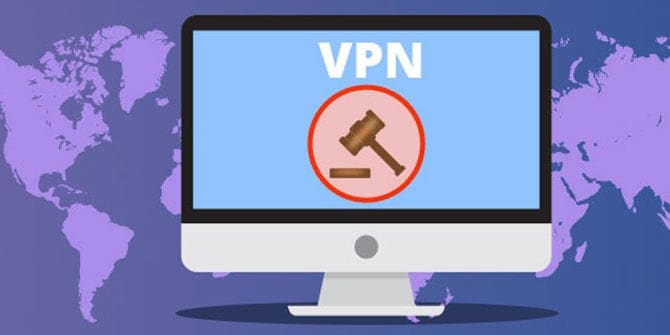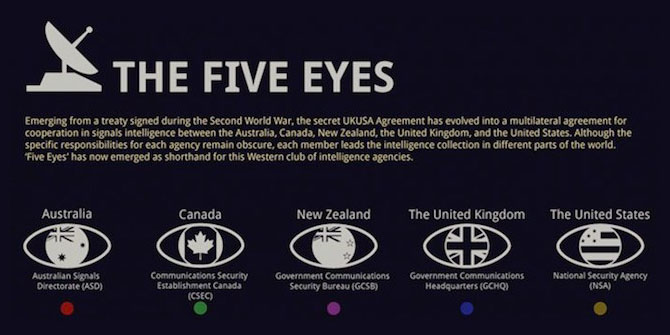Privacy Canada is community-supported. We may earn a commission when make a purchase through one of our links. Learn more.
How To Bypass VPN Blocks Like A Pro (Updated: 2025)
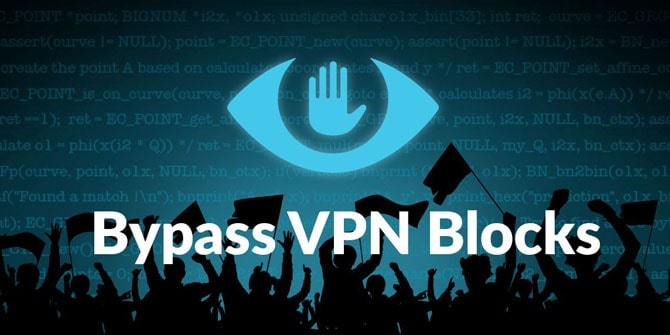
Looking for ways to bypass VPN blocks (for Netflix or anything under the sun)?
Well you’re in luck because that’s exactly what we’re going to share in this article.
But first, how did we get to a point where Netflix actually knows that you’re using a VPN? Surely they aren’t the terrifying omnipresent tech overloads that we imagine them to be… are they?
In 2016, Netflix decided to block content for certain countries, causing many Americans around the to hatch a plot to overthrow their local government. They were determined to go to any lengths which would bring Orange is the New Black back.
Fortunately, a way to get around this block was discovered and the crisis was averted. The solution resided in a simple software known as a VPN. Soon, however, Netflix decided to put up a fight and started blocking the VPNs!
It was almost a checkmate-like move by the streaming company as people were now completely cut off from Netflix in specific regions. That is, of course, until that same curiosity and knowledge from before prevailed again.
Getting Familiar with VPNs
Virtual Private Networks (VPNs) have become quite popular over the past decade. Given their ability to take an unsafe connection to the internet and make it private, it is no wonder that millions of users take advantage of them.
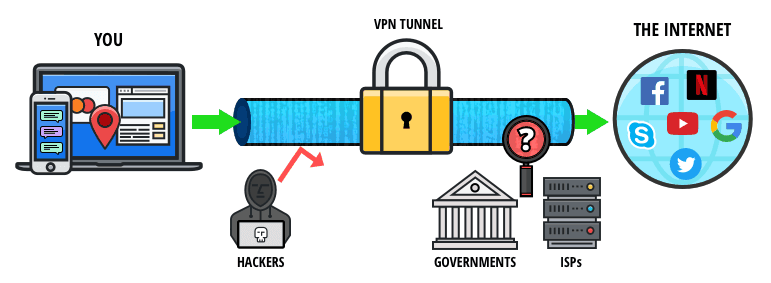
Additionally, VPNs are known for features that allow people to get around certain restrictions including things like geographically-based blocks or internet censorship. Thus, there is a high demand for these networks due to their ability to twist the criteria and easily get past it.
For instance, a lot of the streaming platforms that showcase TV shows, movies, or play music are banned in certain regions. Those who may still want to access them, however, can do so by relying on the power of VPNs.
What is internet censorship and why does it happen?
In simple term, censorship includes any and every act of blocking something from others. For example, music lyrics that are deemed insulting are always censored and, in turn, never played on the radio.
This concept is quite similar to what happens with specific websites on the internet. Online censorship is how many websites limit the content they display, often as determined by a visitor’s location.
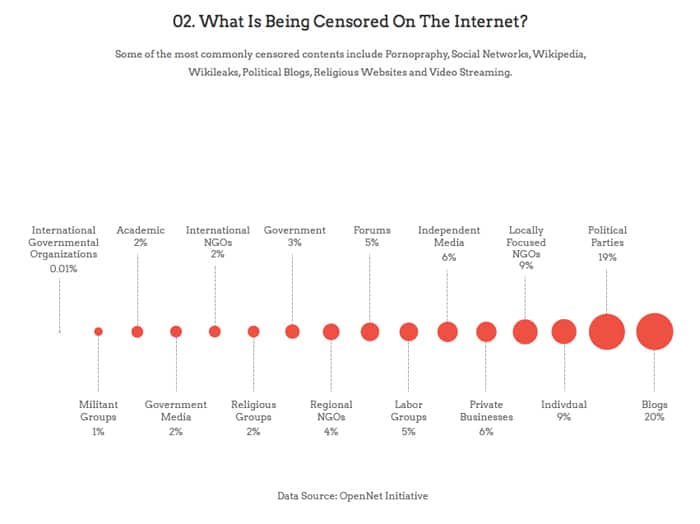
There are many reasons behind internet-based censorship – the most common being confidentiality, legality, and security.
For instance, large companies tend to censor their websites and only display content to those who are eligible to see by being employed by these companies.
This is done to maintain a level of confidentiality that almost all industries rely on. For instance, consider the repercussion of an accounting firm like Ernst and Young losing its website confidentiality. Such a breach would lead to a loss of data privacy and clients’ files would become public knowledge.
Given how the shareholders and investors rely on financial information, such a problem could quite literally destroy many organizations.
Similarly, a lot of websites may get censored for disobeying the laws. Since the unprecedented growth of the internet and its power, laws that address copyrights, patents, and trademarks have been expanded.
Now, any intangible property that someone registers is eligible for protection from the online thieves. For instance, if someone writes a blog, they are entitled to the copyrights of that blog. When another person tries to steal the blog and place it on their website, the original writer can report the issue.
After that, the thief’s website is likely to be censored or completely blocked. So, the reasons for internet censorships are important to understanding as they depict how crucial it is to have the ability to censor certain things.
Where VPNs Come Into Play
Nevertheless, with every valid reason for internet censorship comes a long list of invalid ones. Consider how certain governments block websites that do not share their viewpoints.
In these instances, installing VPNs in order to access content is perfectly understandable. Unfortunately, it is no secret that VPNs have the power to get around internet censorship.
This means that a lot of companies or even governments have found ways to block virtual private networks using techniques like browser fingerprinting and proxy detection.
How do VPNs get blocked?
One of the most common ways that those who do not want people accessing their platform block them is through VPN detectors. Although it is quite self-explanatory, these are the devices used to detect users that are trying to connect to the platform through a virtual private network.
Another way that companies block VPNs revolves around IP addresses. This happens when the VPN server address gets blocked and users cannot use that VPN again.
The problem with this approach is the fact that there are thousands of different VPN providers. Thus, trying to block all of them is like playing a never-ending game of whack-a-mole. Meaning, for every blocked network, five more come out.
Solutions to the Problem
Luckily, companies that block VPNs do not exactly solve the issue related to people bypassing internet censorship or geo-blocking. On the contrary, they simply put another obstacle in the way of people who use these methods.
In translation, blocked VPNs are not impossible to overcome. Some of the most common solutions include mobile browsing, do-it-yourself VPNs, Tor, manipulations with port numbers to overcome port blocking, and much more.
Mobile Browsing
Arguably, using mobile browsing is the easiest way to overcome VPN blocks. It does, however, come with a few disadvantages. First, it only works for those who want to bypass blocks put in place by their employers, school districts, and so on.
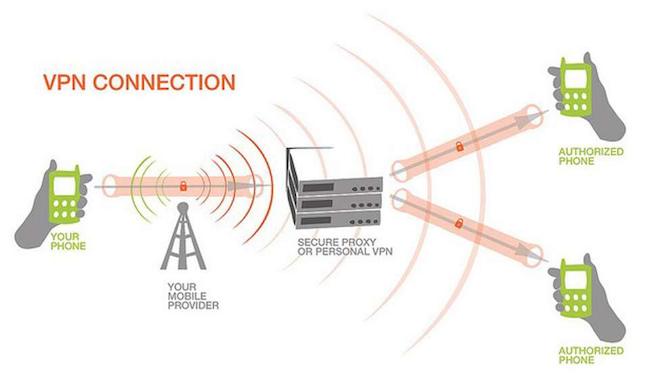
For instance, most schools will have VPN blocks that make it impossible to access any social media platforms. In order to get around this issue, one can just use their phone and cellular network to reach those websites.
As far as the shortcomings go, using mobile devices will not do much for any blocks that were created by high-level institutions like the governments or state agencies.
Making a New One
If a VPN is blocked, sometimes it is much easier to simply find another one that may not have been blocked yet.
For popular websites, however, finding unblocked VPNs could be a long endeavor as large websites tend to be very thorough.
Thus, making a brand new VPN may turn out to be the easiest way to get around the restrictions. The downside of this alternative is the fact that rolling one’s own VPN may be a little tricky. It involves a series of steps that must be executed perfectly in order to create a functioning network.
Fortunately, there are companies that can offer this service for a fee. Also, having one’s own VPN will be a good long-term solution as they will be able to use it for as long as they please.
Tor
Tor is a software that people can access for free in order to completely anonymize their online activity. It functions by bouncing the user’s data through countless relays all over the world.
As a consequence, governments or any other overseeing agency is unable to keep track of one’s activity online. In reality, however, Tor is more focused on providing privacy and does not specialize in accessing censored web pages.
Nevertheless, due to the separation of one’s identity and routing, Tor creates bridges that can bypass blocked IPs. Meaning, it is a loophole that may permit access to blocked content.
Other popular solutions include:
- Psiphon
- Shadowsocks
- TCP port 443
- SSH Tunneling
Given the number of ways in which people can get around VPN blocks, you’re only as limited as you let yourself be.
In other words, it’s fairly simple to access content with a VPN, so long as you have a basic understanding of how they work and how to set up them up (re: turn them on!). Whether accessing different types of blocked pages on the internet should be done, however, is a different topic.
After all, just because one has the means to reach their goal does not always mean that they should do so!



